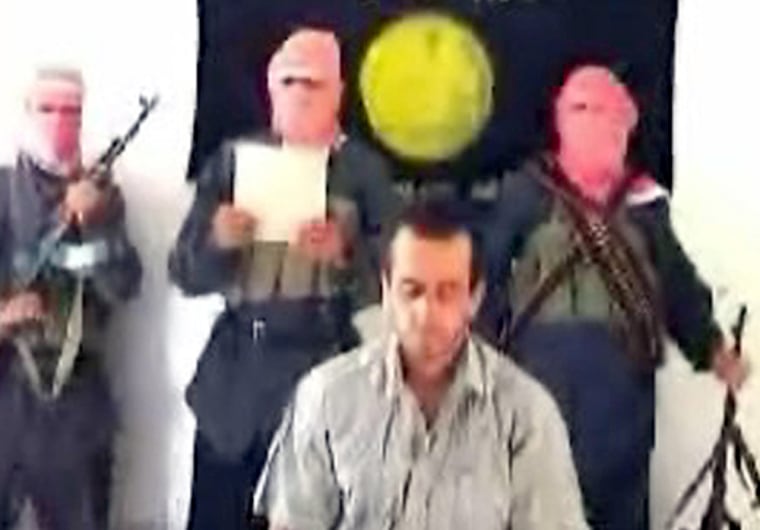Turkey’s truckers association said Monday it would stop delivering goods to U.S. forces in Iraq, in what appeared to be a direct response to insurgents’ brutal, videotaped killing of a Turkish hostage and an attempt to win freedom for two other captives.
A video posted Monday on the Internet showed militants pumping three bullets into the head of a Turkish hostage, identified as Murat Yuce, who was kidnapped in Iraq. It was not clear when the shooting took place. Before he was killed, the man said he worked for the Turkish company Bilintur.
In Ankara, Bilintur told The Associated Press that the catering firm has an employee named Murat Yuce in Iraq, but had no knowledge that he had been killed.
Cahit Soysal, head of the International Transportation Association, said that Turkish truckers hoped that kidnappers would release the two other recently captured Turkish as a result of the organization’s decision to stop deliveries.
Soysal said that 200-300 Turkish trucks bring supplies to U.S. forces in Iraq every day.
He said trucks carrying supplies not destined to the U.S. forces would not be affected. Turkish trucks mostly transport fuel and jet fuel to the U.S. troops, an official from the group said.
In the video, a black banner on the wall behind the kidnappers identified the group as the Tawhid and Jihad, which is led by Abu Musab al-Zarqawi, a Jordanian militant linked to al-Qaida.
On Saturday, Tawhid and Jihad released a video tape saying it had kidnapped two other Turkish truck drivers and threatened to behead them within 48 hours. The militants demanded that the Turk’s employers leave Iraq.
The tape, which was broadcast on the pan-Arab TV channel Al-Jazeera, showed the men’s Turkish passports.
Al-Jazeera said the drivers worked for a Turkish company that delivered goods to U.S. forces in Iraq.
Somali truck driver to be released
In another hostage taking, Tawhid and Jihad said it will release a Somali truck driver it kidnapped because the Kuwaiti company he works for agreed to stop working in Iraq, al-Jazeera said Monday.
In a video aired July 29, the group threatened to behead Ali Ahmed Moussa within 48 hours if his company failed to leave the volatile country.
Moussa appeared kneeling before three black-clad, masked militants armed with assault rifles in the latest video broadcast Monday. One of the militants read a statement, which was inaudible.
The news-reader said the group was releasing Moussa "in appreciation of the attitudes of the Somali government and people toward Iraq and the Kuwaiti company's commitment to stop doing business in Iraq."
Contradictory reports
An Iraqi tribal leader mediating with kidnappers for the release of seven kidnapped truck drivers denied Sunday they had been freed as was claimed by the Kenyan government.
Sheik Hisham al-Dulaimi said negotiations to secure the hostages’ release had broken down and there was no longer contact with the hostage-takers.
A Kenyan government spokesman had said earlier Sunday the truckers — three Kenyans, three Indians and one Egyptian — had been set free.
“This is not true, they’ve not been released,” al-Dulaimi told The Associated Press. “The two sides were unable to reach an agreement, I don’t know what’s going to happen now.”
A diplomat in Baghdad with knowledge of the negotiations also denied that the seven hostages were released.
There was no immediate way to reconcile the reports. Iraq’s intensifying wave of kidnappings, most carried out by small and unknown groups over the past months, has frequently seen unclear and contradicting reports over hostages’ status.
Kenyan government spokesman Alfred Mutua said the three Kenyans, three Indians and Egyptian were freed and taken to the Egyptian Embassy in Baghdad. The three Kenyans were in good health, he said, though he had no word on the others.
The drivers’ Kuwaiti employer, Kuwait and Gulf Link Transport Co., had been working with mediators to win the hostages’ release and a spokeswoman for the company had earlier said they could be freed within hours. India also sent a diplomat to join the talks, and Indian officials have been saying there was progress.
Militants in Iraq have kidnapped more than 70 foreigners in recent months in an effort to push countries out of the U.S.-led coalition that invaded Iraq and toppled Saddam Hussein more than a year ago.
Lebanese hostage freed
Iraqi authorities reported Monday that a Lebanese hostage was freed unharmed after Iraqi police raided his kidnappers’ hideout in an operation that ended with the arrest of three terror suspects.
The release Sunday of Lebanese hostage Vladimir Damaa came after a two-hour shootout with militants in Abu Ghraib, west of Baghdad, said Lt. Col. Mohammed Salman, of the Interior Ministry’s Criminal Intelligence Office.
No one was killed on either side, he said.
Damaa and another Lebanese businessman, Antoine Antoun, both from northern Lebanon, were snatched by gunmen early Saturday from a Baghdad street. Antoun’s fate remains unknown.
